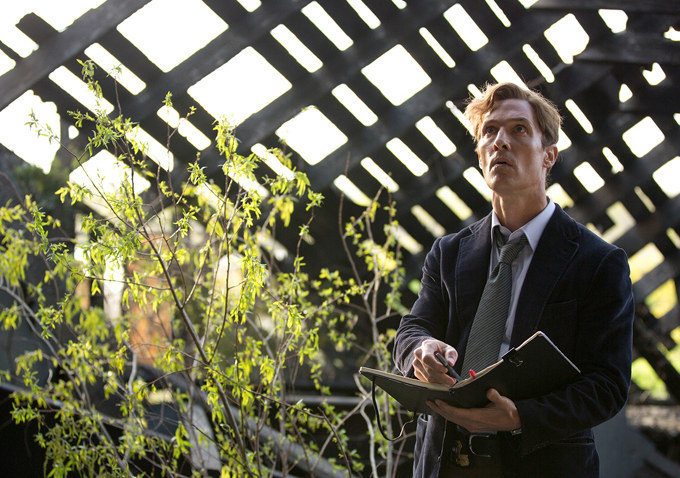 "The only honorable thing for our species to do is deny our programming, stop reproducing and march hand-in-hand into extinction," the always cheerful Rust Cohle says in the memorable, meme-inspiring car conversation sequence from "True Detective." That line and many others from the sequence are heavily indebted to the work of horror writer Thomas Ligotti, in particular his book "The Conspiracy Against the Human Race." While series creator Nic Pizzolatto has cited Ligotti for his influence on the show, two horror scholars have alleged that he stepped over the line from homage to plagiarism.
"The only honorable thing for our species to do is deny our programming, stop reproducing and march hand-in-hand into extinction," the always cheerful Rust Cohle says in the memorable, meme-inspiring car conversation sequence from "True Detective." That line and many others from the sequence are heavily indebted to the work of horror writer Thomas Ligotti, in particular his book "The Conspiracy Against the Human Race." While series creator Nic Pizzolatto has cited Ligotti for his influence on the show, two horror scholars have alleged that he stepped over the line from homage to plagiarism.
A discussion is in progress over at The Lovecraft E-zine, involving the site’s Mike Davis and Thomas Ligotti Online founder Jon Padgett: the two are conversing over email about Pizzolatto’s use of Ligotti, and the latter makes a vigorous case that that the "True Detective" writer crossed an ethical line.
Providing many examples in which dialogue from the show was either paraphrased or lifted almost precisely from Ligotti’s work, Padgett contends the horror writer’s words are at the heart of what makes "True Detective" special. "The most egregious instance of Pizzolatto’s plagiarism involves some of the most captivating and most quoted of all the scenes from the series: namely, the car ride in episode one in which Rust Cohle outlines his pessimistic, anti-natalist worldview definitively and powerfull," he contends. "It is a fact that (in that crucial, character-defining scene) almost every one of Rust’s infamous lines is either taken word for word or is a paraphrase of Ligotti’s distinctive prose and ideas from ‘The Conspiracy Against the Human Race.’ Bear in mind as well that this scene is the lynchpin of Cohle’s character – and it is the scene in which ‘True Detective’ goes from being just another cop buddy procedural to something different, something of exceeding interest to HBO’s audience and a credit to the writer who created Rustin Cohle."
And Padgett doesn’t buy the argument that Pizzolatto was honoring Ligotti by citing his books. " ‘Homage’ suggests that Pizzolatto was honoring Ligotti or showing him respect of some sort. Lifting Ligotti’s work without permission or attribution may have or may not have been a consciously malicious decision, but in any case it was neither honorable nor reverential," he says.
Padgett also points out that Pizzolatto usually only talks about Ligotti when asked directly, and certainly doesn’t go out of his way to mention how much of an influence he was on the show. For Davis, this is a crucial sticking point. "He could have acknowledged Ligotti any number of times — he didn’t. He only did it when an interviewer cornered him with evidence that he lifted directly from Ligotti’s book. He could have given Ligotti the credit on the DVD commentary — he didn’t. (Which completely negates his “I can’t talk about Ligotti until the series is over” excuse.) Pizzolatto seems to want the TV-viewing public to think that he came up with those phrases and ideas," he wrote in a separate editorial.
But it doesn’t end there. Padgett also points to other instances where Pizzolatto seemingly borrowed from the works of other author. "I would add that the extent of Pizzolatto’s plagiarism problem goes a good bit further than his penchant for using Ligotti’s words and ideas. In episode five, for instance, Cohle explains that, ‘…death created time to grow the things that it would kill…’ Deep thoughts, care of William S. Burroughs’ obscure (and expensive to buy) collection ‘Ah Pook Is Here and Other Texts,’ in which Burroughs writes, ‘Death needs time for what it kills to grow in.’ If this is another example of what Pizzolatto considers an homage, why the rewording?" Padgett says. "Why not ‘signal [Burroughs] readers’ with a word for word quote? Even the late great Albert Einstein’s words are mined for dialogue material – specifically this quote: ‘If people are good only because they fear punishment… then we are a sorry lot indeed.’ Of course, Pizzolatto also ends the season’s finale with dialogue lifted from one of writer Alan Moore’s lesser known comic books. With ‘homages’ like these, who needs the theft of intellectual property? It makes one wonder how many more undiscovered ‘homages’ are to be found within these True Detective episodes."
It’s a strong accusation, and there’s been no response yet from the reclusive Ligotti, Pizzolatto or HBO just yet. But we’re sure you’ll want to have your say, so hit the comments section below and be sure to read the full Davis/Padgett conversation here which details many of the instances of alleged plagiarism.

